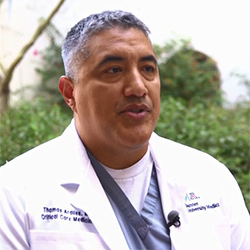Hispanic Heritage Month: Thomas Ardiles, MD
The University of Arizona College of Medicine – Phoenix is proud to highlight a few of our Hispanic students and faculty during Hispanic Heritage Month (Sept. 15th – Oct. 15th).

Dr. Ardiles discusses his work, background and words of encouragement for others.
Describe your background and path toward medicine.
I was born and raised in Lima, Peru. I graduated from an eight-year combined undergraduate-graduate school at Universidad Peruana Cayetano Heredia. It was very rigorous training, but it nurtured the love for medicine and science within me.
What does Hispanic Heritage Month mean to you?
It is a good reminder of what makes the United States a great nation — that people from many backgrounds are welcome to make this a great community.
What words of encouragement do you have for children of Hispanic heritage regarding STEM education and careers?
Keep the values your parents and grandparents teach you, always do your best, but don't forget to give back to your community.
How has your background influenced your practice?
Being an immigrant myself, I understand the fears that come from being in a new place and the value of communication in a familiar language. The uncertainty of illness makes patients and families very anxious. A smile and a conversation in our own language helps a lot under stressful circumstances.
As a physician working on the frontlines during the pandemic, what has been your experience?
It was the hardest experience of my life. Even if we surge again, there will be less unknowns and less uncertainty. Having the families away from patients made it even harder when we had to face difficult conversations.
What do you want the community to know about your work during this time?
That we are here for them. We will risk our lives again if we need to. We trust that the Phoenix community will continue to understand that we will live in this pandemic for a while, and we have to continue to care for each other.
Anything else to add?
The pandemic has shown how great of a team we have at Banner – University Medical Center Phoenix. I have been saying lately that the pandemic is only bringing to the surface things that are already there, unfortunately focusing too much on the problems. It has also brought to the front the strength, unity and commitment that our team had to care for our patients: my valued physician partners, including our fellows and residents, our nurses, respiratory therapists, pharmacists, Lab and X-ray technicians, our brave housekeepers and so many people that I am afraid I am forgetting that helped us all survive the worst.
About the College
Founded in 2007, the University of Arizona College of Medicine – Phoenix inspires and trains exemplary physicians, scientists and leaders to advance its core missions in education, research, clinical care and service to communities across Arizona. The college’s strength lies in our collaborations and partnerships with clinical affiliates, community organizations and industry sponsors. With our primary affiliate, Banner Health, we are recognized as the premier academic medical center in Phoenix. As an anchor institution of the Phoenix Bioscience Core, the college is home to signature research programs in neurosciences, cardiopulmonary diseases, immunology, informatics and metabolism. These focus areas uniquely position us to drive biomedical research and bolster economic development in the region.
As an urban institution with strong roots in rural and tribal health, the college has graduated more than 1,000 physicians and matriculates 130 students each year. Greater than 60% of matriculating students are from Arizona and many continue training at our GME sponsored residency programs, ultimately pursuing local academic and community-based opportunities. While our traditional four-year program continues to thrive, we will launch our recently approved accelerated three-year medical student curriculum with exclusive focus on primary care. This program is designed to further enhance workforce retention needs across Arizona.
The college has embarked on our strategic plan for 2025 to 2030. Learn more.